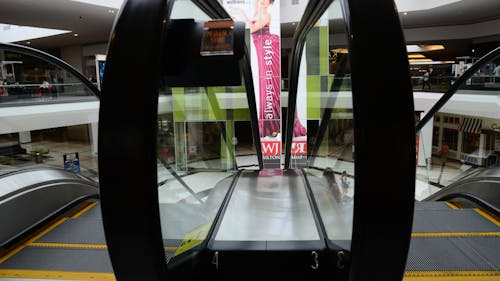MILITARU: As malls decline, new social spaces should take their place
Column: Opinions No One Asked For

As a child, there was no greater joy than finding a loose button on the floor of some massive department store, while my mother dug through bins to find something that both I (a girl) and my younger brother could wear without objecting to the color or design.
I would scavenge the children’s section for shiny objects like a magpie. The women’s section had the best collection by far, with the greatest assortment of buttons, beads, sequins, pins and loose threads that had been shaken off some items of clothing by a rushed and overworked employee.
When I outgrew my packrat phase, I would walk through these malls with friends or on dates just to window shop, picking up the ugliest clothes to laugh at them together and wonder who could possibly spend $67.40 on an electric blue jumpsuit.
The department store, and by extension, the mall, was a staple of my life that grew up with me.
There is no household in this nation that does not have some connection to the standard American mall. Maybe it is the smell of Auntie Anne's pretzels and some version of Chinese food enticing you to spend the last bit of your allowance, the sound of pins clattering during a nervous first date at the bowling alley or maybe the pride of being the employee of the month at your Modell's Sporting Goods summer job on the second floor of the shopping complex.
And yet, despite the massive amount of time we spend in the shopping mall, the neon “STORE CLOSING” signs are present on the side of every highway. The irony of being able to purchase these signs on Amazon should not be lost on you.
The "retail apocalypse," as it is now called, did not begin in 2020. The endless list of stores closing this year is the result of years of technological advancements they simply could not keep up with. The convenience of Amazon simply outweighs the social experience of shopping in person.
While it may be tempting to shift blame onto CEO of Amazon Jeff Bezos, ask yourself how many times you have opted to shop online as opposed to in-store. We, collectively, decided that convenience outweighs the social value of retail, the same way we decided that the convenience of the mall outweighed the social value of family-owned businesses.
My ode to the American mall should not be misconstrued as rose-colored glasses. The human rights abuses of consumerism both in the United States and abroad facilitated by massive corporations should not be forgotten nor excused.
The buttons I would pick up off the floor as a six-year-old were sewn onto a garment by a child roughly my age in countries like China, India and Bangladesh. The human rights abuses behind American consumerism are not new.
Exploitation of human beings for the sake of convenience is easy to forget when you are on the receiving end of the goods being manufactured by people you have never met and likely will never think twice about.
In many ways, the shopping complexes that dot our country represent our worst characteristics as Americans from ignorance to selfishness. We mindlessly pick items off the shelf without thinking about the time that went into making them, their effects on our lives and where they will go when we get tired of them.
Shopping malls, like any other bastion of human activity, produce staggering amounts of pollution that seep into local communities and towns.
Pollution is not just environmental. The cultural pollution of the department stores is seen in the way mom-and-pop stores have closed across the country. The individuality and quality of human interaction that was lost with the mom-and-pop stores were never replaced. The mall may have taken its place as a marketplace, but the personal relationships between shopkeepers and their customers died out.
We are in a similar situation now. Malls as community spots are quickly disappearing and are not being replaced in any way. The last bastions of human interaction (indoors at least) are restaurants, doctors and the Department of Motor Vehicles.
The first because it is a bit difficult to eat food via Zoom, the second because a diagnosis requires some physical contact and the third because the United States needs to keep at least some people employed.
We need a new public library (with a twist), a space that people can occupy freely for the purpose of socializing with friends and family or just meeting new people. Community spaces have been quietly pushed for years but to no avail.
An indoor or public space that an individual can occupy without spending money is vital to the health of any community, but the profits are not cold hard cash. It would be incredibly convenient to brush off the necessity of these spaces, especially those of us in more privileged communities, but we need to ask ourselves, at what point does our love for convenience become indolence.
Alice Militaru is a School of Arts and Sciences sophomore majoring in economics. Her column, "Opinions No One Asked For," runs on alternate Tuesdays.
*Columns, cartoons and letters do not necessarily reflect the views of the Targum Publishing Company or its staff.
YOUR VOICE | The Daily Targum welcomes submissions from all readers. Due to space limitations in our print newspaper, letters to the editor must not exceed 900 words. Guest columns and commentaries must be between 700 and 900 words. All authors must include their name, phone number, class year and college affiliation or department to be considered for publication. Please submit via email to [email protected] by 4 p.m. to be considered for the following day’s publication. Columns, cartoons and letters do not necessarily reflect the views of the Targum Publishing Company or its staff.



